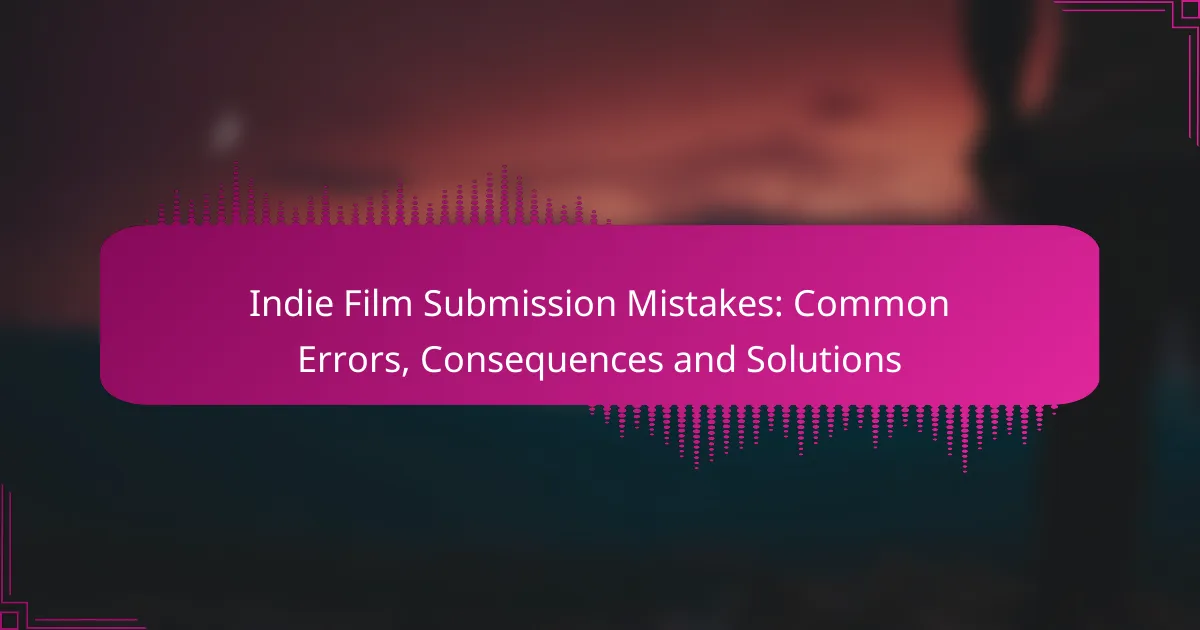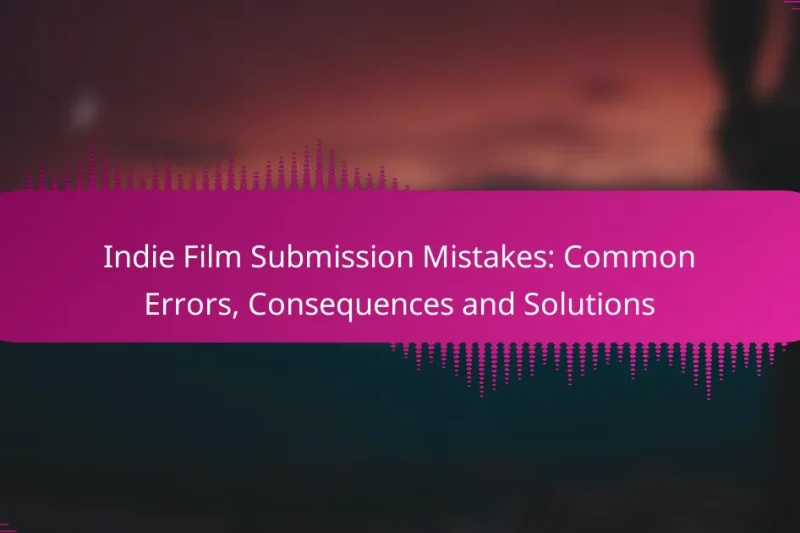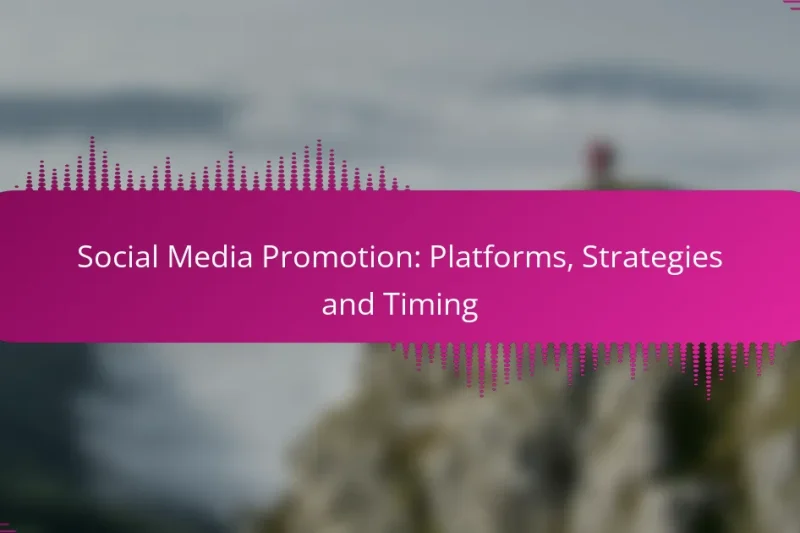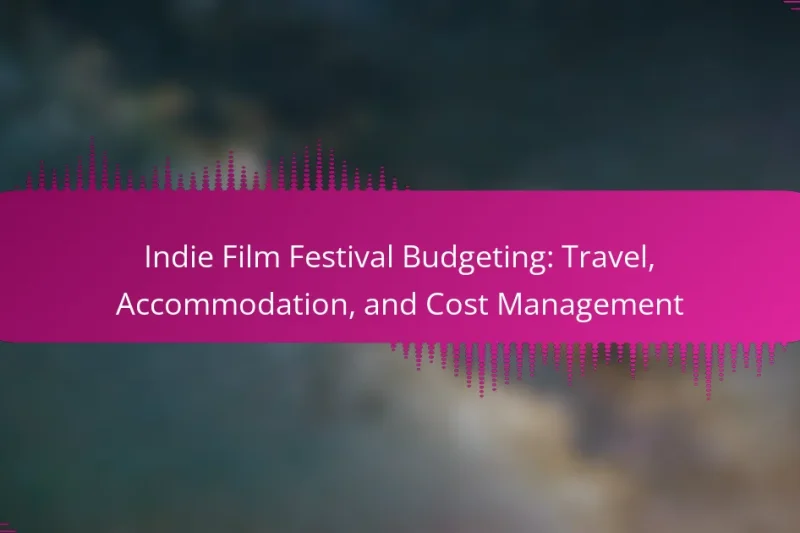Submitting to indie film festivals requires careful attention to key elements that can enhance your film’s … Indie Film Festival Submission Guidelines: Key Elements, Common Pitfalls and Best PracticesRead more
Navigating the world of indie film festivals can be both exciting and daunting. This guide will equip you with essential strategies for preparation, submission, and maximizing your experience at these events. From understanding festival requirements to crafting a compelling marketing plan, you'll learn how to enhance your chances of success in showcasing your film.
Indie Film Submission Mistakes: Common Errors, Consequences and Solutions
Submitting an indie film can be a daunting process, and common mistakes can severely impact a … Indie Film Submission Mistakes: Common Errors, Consequences and SolutionsRead more
Indie Film Festival Early Bird Deadlines: Benefits, Strategies and Considerations
Submitting your film to indie film festivals during early bird deadlines can provide filmmakers with valuable … Indie Film Festival Early Bird Deadlines: Benefits, Strategies and ConsiderationsRead more
Social Media Sharing: Engagement Techniques, Content Strategies and Audience Growth
Social media sharing is a powerful tool for enhancing audience engagement and growth through effective interaction … Social Media Sharing: Engagement Techniques, Content Strategies and Audience GrowthRead more
Festival Screenings: Future Distribution Deals, Networking Opportunities and Exposure
Festival screenings serve as a vital platform for filmmakers, offering enhanced visibility and crucial networking opportunities … Festival Screenings: Future Distribution Deals, Networking Opportunities and ExposureRead more
Indie Filmmaker Networking: Strategies, Connections, and Follow-Up
Networking is essential for indie filmmakers looking to enhance their career opportunities and build meaningful connections … Indie Filmmaker Networking: Strategies, Connections, and Follow-UpRead more
Social Media Promotion: Platforms, Strategies and Timing
Social media promotion is essential for reaching your target audience and achieving marketing goals, with platforms … Social Media Promotion: Platforms, Strategies and TimingRead more
Follow-Up Plan: Audience Engagement, Distribution Strategy and Feedback Incorporation
A well-structured follow-up plan is crucial for enhancing audience engagement, optimizing content distribution, and effectively incorporating … Follow-Up Plan: Audience Engagement, Distribution Strategy and Feedback IncorporationRead more
Indie Film Festival Budgeting: Travel, Accommodation, and Cost Management
Budgeting for travel to indie film festivals is crucial for filmmakers looking to manage their expenses … Indie Film Festival Budgeting: Travel, Accommodation, and Cost ManagementRead more
Distributors: Building Relationships at Indie Film Festivals
Building relationships with distributors at indie film festivals is crucial for filmmakers seeking to enhance their … Distributors: Building Relationships at Indie Film FestivalsRead more
How to Prepare for an Indie Film Festival?
Preparing for an indie film festival involves thorough planning and strategic execution. By understanding the festival's requirements, creating a timeline, and developing a marketing strategy, you can enhance your chances of success.
Research festival requirements
Each indie film festival has specific submission guidelines, including eligibility criteria, format specifications, and deadlines. Familiarize yourself with these requirements to avoid disqualification.
Look for details on submission fees, premiere status, and any additional materials needed, such as press kits or promotional images. This information is often available on the festival's official website.
Create a submission timeline
Establishing a submission timeline is crucial for staying organized and meeting deadlines. Start by marking the festival dates and working backward to set milestones for completing your film and preparing your submission materials.
Include time for revisions, feedback from peers, and any necessary edits. Aim to finish your film at least a few weeks before the submission deadline to allow for unexpected delays.
Develop a marketing strategy
A strong marketing strategy can significantly increase your film's visibility at the festival. Identify your target audience and consider how to engage them through social media, press releases, and promotional events.
Utilize platforms like Instagram and Twitter to build anticipation and connect with potential viewers. Collaborate with influencers or bloggers who focus on indie films to expand your reach.
Network with other filmmakers
Networking is a vital component of the indie film festival experience. Attend panels, workshops, and social events to meet fellow filmmakers, industry professionals, and potential collaborators.
Building relationships can lead to valuable opportunities, such as co-productions or distribution deals. Be open to sharing your experiences and learning from others in the community.
Budget for festival expenses
Creating a budget for festival expenses is essential to avoid financial strain. Consider costs such as submission fees, travel, accommodation, and promotional materials.
Estimate your expenses and explore potential funding options, like crowdfunding or sponsorships. Keep track of your spending to ensure you stay within your budget while maximizing your festival experience.
What Are the Best Indie Film Festivals in the US?
The best indie film festivals in the US showcase a diverse range of independent films, providing filmmakers with valuable exposure and networking opportunities. Key festivals include Sundance, SXSW, Tribeca, and AFI Fest, each offering unique experiences and benefits for attendees and participants.
Sundance Film Festival
Sundance Film Festival, held annually in Park City, Utah, is one of the most prestigious indie film festivals in the world. It typically takes place in January and features a wide array of films, including documentaries, narrative features, and short films.
Filmmakers should be aware that Sundance is highly competitive, with thousands of submissions each year. Attending the festival can provide invaluable networking opportunities, but it’s essential to plan accommodations and travel well in advance due to high demand.
South by Southwest (SXSW)
SXSW, based in Austin, Texas, combines film, music, and interactive media, making it a vibrant hub for creatives. The festival occurs in March and showcases a mix of premieres, panels, and networking events.
Filmmakers should consider the unique blend of industries at SXSW, which can lead to cross-promotional opportunities. It's advisable to secure badges early, as they can sell out quickly, and to explore local accommodations that fit your budget.
Tribeca Film Festival
Tribeca Film Festival takes place in New York City each April, focusing on independent films and storytelling. It features a variety of genres and formats, including feature films, shorts, and immersive experiences.
This festival is known for its strong community engagement and offers filmmakers a chance to connect with audiences through Q&A sessions and panel discussions. Participants should be prepared for a bustling urban environment and consider public transportation options for getting around.
AFI Fest
AFI Fest, hosted by the American Film Institute in Los Angeles, typically occurs in November and highlights international cinema alongside American independent films. The festival is free to the public, making it accessible for a wide audience.
Filmmakers should take advantage of the festival's focus on networking and industry panels, which can provide insights into the film business. It's beneficial to arrive early for screenings, as popular films can fill up quickly, and to engage with fellow attendees for potential collaborations.
How to Submit Your Film to Festivals?
Submitting your film to festivals involves selecting the right events, preparing your materials, and adhering to specific guidelines. Understanding these steps can significantly enhance your chances of acceptance.
Choose the right festivals
Selecting the appropriate festivals is crucial for your film's success. Research festivals that align with your film's genre, themes, and target audience. For example, a documentary may fit better in a festival known for non-fiction films.
Consider the festival's reputation, audience size, and potential for networking. Some festivals, like Sundance or Cannes, are highly competitive, while others may offer more opportunities for emerging filmmakers.
Prepare your film submission package
Your submission package typically includes a screener, a synopsis, a director's statement, and promotional materials like posters or stills. Ensure your screener is of high quality and formatted according to the festival's specifications.
Include a brief but compelling synopsis that captures the essence of your film. A well-crafted director's statement can also provide insight into your creative vision and intentions.
Understand submission fees
Most film festivals charge submission fees, which can vary widely. Fees may range from around $10 to several hundred dollars, depending on the festival's prestige and the submission deadline.
Be mindful of early bird deadlines, which often offer lower fees. Budget for these costs as part of your overall festival strategy, and look for festivals that may waive fees for certain categories or underrepresented filmmakers.
Follow submission guidelines
Each festival has specific submission guidelines that must be followed meticulously. These guidelines can include formatting requirements, length restrictions, and deadlines.
Read the rules carefully to avoid disqualification. Common pitfalls include submitting the wrong file format or missing required materials. A checklist can help ensure you meet all criteria before submitting your film.
What Are Common Mistakes to Avoid?
Avoiding common mistakes at film festivals can significantly enhance your chances of success. Key pitfalls include ignoring festival rules, submitting late, providing poor quality materials, and neglecting marketing efforts.
Ignoring festival rules
Each film festival has specific rules and guidelines that must be followed for submission. Ignoring these can lead to disqualification or rejection. Always read the festival's regulations thoroughly, including eligibility criteria, submission formats, and deadlines.
For instance, some festivals may only accept films of a certain length or genre. Make sure your film aligns with these requirements to avoid unnecessary setbacks.
Submitting late
Late submissions can result in automatic disqualification from a festival. Most festivals have strict deadlines, and missing them can mean losing your chance to showcase your work. Set reminders well in advance of the due date to ensure timely submission.
Consider submitting your film a few days before the deadline to account for any unforeseen issues. This buffer can save you from last-minute stress and complications.
Poor quality materials
Submitting low-quality materials, such as a poorly edited film or subpar promotional content, can diminish your film's chances of being selected. Ensure your film is polished and meets industry standards before submission.
Additionally, provide high-resolution images and a well-crafted synopsis. These materials are often the first impression festival judges have of your work, so make them count.
Neglecting marketing
Effective marketing is crucial for gaining visibility at film festivals. Failing to promote your film can lead to missed opportunities for networking and audience engagement. Develop a marketing plan that includes social media promotion, press releases, and outreach to film bloggers.
Consider creating a dedicated website or social media pages for your film to build a following. Engaging with potential viewers and industry professionals can significantly enhance your film's profile at the festival.
How to Network at Film Festivals?
Networking at film festivals is crucial for building connections and advancing your career in the industry. Engaging with fellow filmmakers, industry professionals, and audiences can lead to collaborations, opportunities, and valuable insights.
Prepare Your Elevator Pitch
Your elevator pitch is a brief, engaging summary of your project or yourself that can be delivered in about 30 seconds. Focus on the unique aspects of your film or your role in the industry to capture attention quickly. Tailor your pitch to your audience, whether they are fellow filmmakers, producers, or potential investors.
Practice your pitch beforehand to ensure clarity and confidence. A well-prepared pitch can make a lasting impression and open doors for further conversation.
Attend Networking Events
Film festivals often host networking events, panels, and workshops specifically designed for attendees to connect. Make it a priority to attend these gatherings, as they provide structured opportunities to meet industry professionals. Look for events that align with your interests or goals.
Engage actively during these events by asking questions and sharing your insights. Follow up with new contacts after the festival to maintain the connections you’ve made.
Utilize Social Media
Social media platforms are powerful tools for networking before, during, and after film festivals. Use platforms like Twitter, Instagram, and LinkedIn to connect with other attendees and share updates about your film. Create a festival-specific hashtag to engage with others and promote your work.
Join relevant groups or forums to participate in discussions and seek advice from experienced filmmakers. This online presence can enhance your visibility and help you establish relationships that extend beyond the festival.
Follow Up After the Festival
Following up with contacts made during the festival is essential for solidifying relationships. Send personalized messages expressing appreciation for their time and referencing specific conversations you had. This shows genuine interest and helps you stand out.
Consider scheduling a coffee chat or virtual meeting to discuss potential collaborations or seek advice. Maintaining these connections can lead to future opportunities in the film industry.














